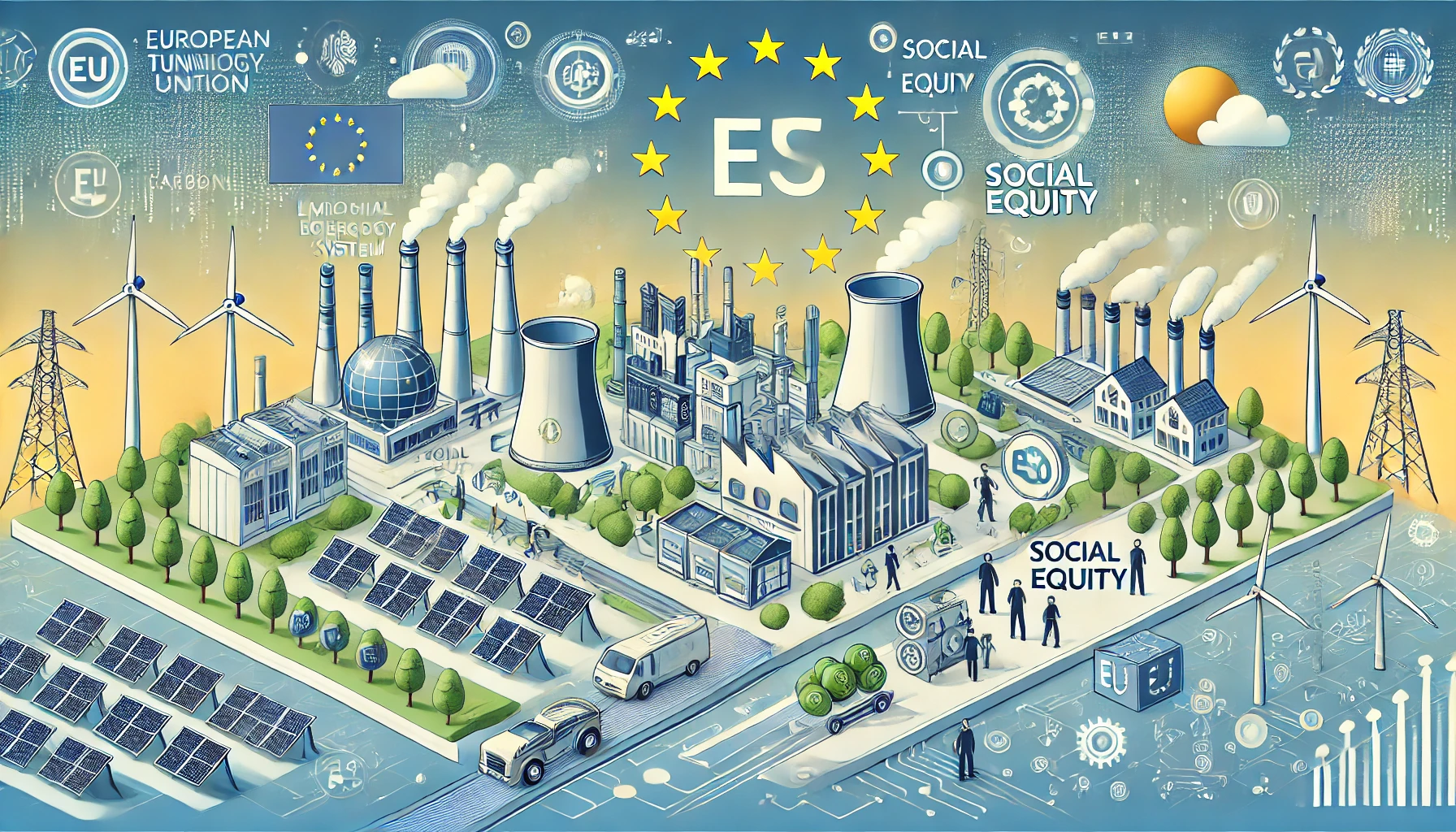Transforming Carbon Markets: The EU’s Roadmap to Net-Zero Through ETS Reforms
The document highlights the European Union’s efforts to strengthen its Emissions Trading System (ETS) through tighter emissions caps, expanded scope, and innovative carbon accounting practices, aiming to achieve net-zero emissions by 2050. It emphasizes harmonizing standards, leveraging technology, and addressing equity concerns to ensure a just and sustainable transition.

The document, authored by researchers from leading European institutions specializing in environmental policy and climate change, examines the vital role of carbon accounting in the European Union's (EU) recently reformed Emissions Trading System (ETS). As the largest carbon trading market globally, covering over 40% of the EU's greenhouse gas emissions, the ETS is central to achieving the EU’s ambitious goal of reaching net-zero emissions by 2050. The system has undergone significant reforms to enhance its effectiveness, introducing stricter emissions caps and expanding its scope to include sectors like shipping and buildings. These changes align with the European Green Deal's overarching climate objectives. By doing so, the EU hopes to solidify its position as a global leader in climate action while ensuring that the ETS becomes an even more effective driver of decarbonization.
The Backbone of Transparency and Accountability
A central focus of the study is the critical role of carbon accounting in supporting the ETS. Carbon accounting forms the foundation for the measurement, reporting, and verification of emissions, ensuring the transparency and reliability of the system. With the recent expansion of the ETS to new industries, the complexity of tracking emissions has increased. The researchers emphasize that harmonizing carbon accounting standards across all 27 EU member states is essential to maintaining fairness and consistency. However, this task is far from straightforward, given the economic and technical disparities among member states. Addressing these challenges is key to preventing loopholes and ensuring the ETS delivers meaningful emissions reductions. The study also highlights the risks associated with fragmented carbon accounting frameworks, which could undermine the ETS's integrity and compromise its effectiveness in driving down emissions.
Harnessing Technology for Carbon Innovation
The research explores how emerging technologies can revolutionize carbon accounting practices and strengthen the ETS. Digital tools like blockchain, artificial intelligence, and integrated data platforms offer transformative potential in improving the accuracy and efficiency of emissions tracking. These innovations not only streamline the reporting process but also foster greater engagement among businesses and consumers, encouraging a cultural shift toward low-carbon behaviors. For example, blockchain technologies can provide immutable records of emissions data, enhancing trust in the system. However, the researchers emphasize that these advanced tools must be accessible to all sectors and regions, especially those facing resource constraints. Capacity-building initiatives, training programs, and financial support will be crucial to ensure widespread adoption and effective utilization of these technologies. By investing in such innovations, the EU can strengthen its carbon accounting ecosystem and create a more inclusive pathway toward decarbonization.
Balancing Equity and Economic Transformation
While the ETS reforms promise significant environmental benefits, the study acknowledges their potential social and economic implications. Carbon pricing, a key mechanism of the ETS, increases the cost of carbon-intensive activities, incentivizing businesses to adopt cleaner technologies. However, this shift could disproportionately affect vulnerable populations, particularly low-income households and workers in carbon-intensive industries. To address these equity concerns, the document advocates for complementary policies such as social assistance programs, retraining initiatives for displaced workers, and proactive investments in creating green jobs. These measures are essential not only for mitigating the social impacts of the transition but also for building public trust and support for climate policies. By prioritizing a just transition, the EU can ensure that the benefits of decarbonization are shared equitably across all member states and societal groups.
Toward a Unified and Sustainable Future
The document underscores that the ETS reforms, coupled with robust carbon accounting practices, have the potential to drive transformative change in the EU’s economy. The tightening of emissions caps and the inclusion of new sectors are expected to send stronger market signals, incentivizing investment in low-carbon technologies and positioning the EU as a global leader in clean energy innovation. However, the researchers caution that this transition must strike a delicate balance between ambition and feasibility. Overly stringent policies could alienate industries and erode public support, while insufficient measures might fail to achieve the necessary emissions reductions. Achieving this balance will require close collaboration among policymakers, businesses, and civil society to align economic, environmental, and social objectives.
Carbon accounting is portrayed in the document as a linchpin of the EU’s climate strategy, underpinning the credibility and success of the ETS and related policies. By aligning carbon accounting practices with the evolving ETS framework, the EU can enhance transparency, accountability, and fairness, while fostering innovation and economic growth. The study calls for ongoing efforts to harmonize standards, leverage advanced technologies, and invest in capacity building to ensure all stakeholders can participate in and benefit from the transition to a low-carbon economy. With these integrated approaches, the EU is well-positioned to meet its net-zero emissions target by 2050, setting an example for the rest of the world in how to achieve sustainable and equitable climate action. Through its leadership in carbon trading and accounting, the EU demonstrates that climate goals can be ambitious yet attainable, provided they are grounded in robust systems and collaborative efforts.
- FIRST PUBLISHED IN:
- Devdiscourse
ALSO READ
Thrilling Week in Asian Football: Upsets and Victories
News Corp Sells Foxtel to DAZN: A $2 Billion Streaming Shakeup
Gurdaspur Encounter: Three Khalistani Terrorists Neutralized
Asian Markets Surge Amid U.S. Inflation Optimism and Avoided Government Shutdown
Eurozone Inches Closer to Inflation Goal, Says ECB's Lagarde










